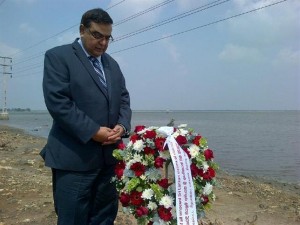 |
| Obhrai lays a wreath at Elephant Pass (12/11/13). Photograph Colombo Gazette |
The ongoing human rights abuses in Sri Lanka were “an elephant in the room” that the government of Sri Lanka cannot hide from said Canada's Parliamentary Secretary for Foreign Affairs and International Human Rights, Deepak Obhrai, during a media roundtable on November 30th held together with Corneliu Chisu the MP for Scarborough East-Pickering, regarding his recent visit to Sri Lanka as Canada's representative to the Commonwealth Heads of Government Meeting.
Stating that he had made the visit to Jaffna via an 8 hour drive, after the Sri Lankan government cancelled all flights to Jaffna, Mr. Obhrai drew on his experiences in Jaffna, where he met with newly elected Chief Minister Wigneswaran, Bishop Savundranayagam of Jaffna, and visited the offices of the Jaffna newspaper, the Uthayan, where he met with the paper’s editor, and said that in his meetings he was consistently told of the lack of reconciliation, increasing disregard of human rights, rule of law, and freedom of religion was emphasised by key players in Jaffna.
Responding to questions by the journalists gathered, Mr. Obhrai drew attention to the prevalence of political intimidation and the climate of fear in Jaffna, which he noted “seemed pretty strange considering a government (the TNA) has won an electoral mandate.”
Asked by Tamil Guardian to explain the seeming inconsistency in the Canadian government's approach to human rights, where despite Prime Minister Harper's boycott of CHOGM, Tamil refugees continue to be deported to Sri Lanka despite overwhelming documented evidence of returned deportees facing detention, abuse and torture, Mr. Obhrai said,
“Before somebody is deported out of the country, not only to Sri Lanka, but any other country, there is a very rigid process in place in Canada where they can make appeals and say, indicate to us, why there is a threat to their lives or anything. So this process gives them tremendous opportunity, to all claimant refugees to make a genuine claim.""It is the question that is raised whether the claim is genuine or not, that is for the independent—and there is an independent board to make the decision, it’s not for the government. The government does not make the decision. Once the independent board has rejected a claim, then the government has to fulfill that mandate.”
Highlighting his trip to the Uthayan, which became a focal point of the British premier's visit too, Mr. Obhrai criticised the Sri Lankan government's lack of protection or investigation for threats and violence against journalists.
“Every time people speak against the government there seems to be a lot of fear. Why would there be a lot of fear in a democratic country?” questioned Mr. Obhrai, as he said that he had noticed a sense of fear across the island too.
Reiterating the Harper government’s call for an independent inquiry saying “we expect the Sri Lankan government to create a credible, transparent accountability of everybody,” Mr. Obhrai's comments however, fell short of the British premier's call for an international inquiry in the absence of credible action by the Sri Lankan government before March 2014.
| Analysis: Elephants in the room
by Geetha Philipupillai
Despite the Prime Minister’s boycott of CHOGM and Mr. Obhrai’s criticisms of human rights abuses, closer examination of Canada’s policy towards Sri Lanka reveals a far from principled stance. Strongly advocating for an independent international inquiry, coupled with a moratorium on deportations to Sri Lanka would give greater credence to Canada’s calls for Sri Lanka to uphold key Commonwealth principles including accountability on human rights. As it stands, Canada’s continued co-operation with the Sri Lankan government on the deportation of Tamil refugees risks becoming another “elephant in the room.” |
We need your support
Sri Lanka is one of the most dangerous places in the world to be a journalist. Tamil journalists are particularly at threat, with at least 41 media workers known to have been killed by the Sri Lankan state or its paramilitaries during and after the armed conflict.
Despite the risks, our team on the ground remain committed to providing detailed and accurate reporting of developments in the Tamil homeland, across the island and around the world, as well as providing expert analysis and insight from the Tamil point of view
We need your support in keeping our journalism going. Support our work today.
For more ways to donate visit https://donate.tamilguardian.com.

